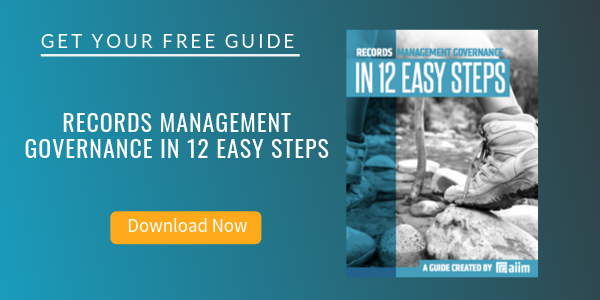
14 Must Knows about Information Governance
These 14 “must-knows” are drawn from a survey of 487 information professionals conducted in April. Survey respondents represent organizations of all sizes. Larger organizations over 5,000 employees represent 33%, with mid-sized organizations of 500 to 5,000 employees at 39%. Small-to-mid sized organizations with 10 to 500 employees constitute 28%. 74% of the participants were from North America, and 19% from Europe.
-
On the whole, organizations are stabilizing the volume of paper records, but electronic records are “increasing rapidly,” in 68% of organizations surveyed. While 32% reported an actual decrease in their paper records, not one respondent could report a decrease in electronic records.
-
Only 12% of respondents feel confident that they store only what they need to store. 42% are not confident about what is safe to delete.
-
43% feel that automated classification is the only way to keep up with rapidly increasing information volumes. 14% are already using it, but a further 35% have immediate plans for adoption.
-
Of those already using auto-classification, only 10% have been disappointed with the results. In particular, classifying scanned documents has performed better than or as well as expected for 83% of users.
-
Improved searchability, higher productivity, and defensible compliance are given as the top three benefits from automated classification.
-
The three biggest risks from a failure of information governance are excess litigation costs, loss of intellectual property, and damage to reputation. 24% have had a compliance issue around litigation and discovery in the last 2 years.
-
40% of organizations have recently moved or plan to move in the next year or so, from a traditional RM view to a much wider IG view. 33% are still working in classic RM mode, including 18% who are still taking a mostly paper-records view.
-
The three biggest benefits from good information governance are reduction in storage costs, exploiting and sharing knowledge resources, and faster response to events and inquiries. Users are also becoming more aware of the need to support big data analytics.
-
Getting senior level endorsement and involvement is the biggest issue in creating an IG policy. Then enforcement once the policy has been agreed.
-
Only 10% have an IG policy in place that is respected and enforced – 21% have a policy in place, but it is mostly ignored. For 55%, the IG policy is a work-in-progress.
-
Of those who have information governance policies, only 19% regularly audit for compliance. 40% of organizations do not allocate any staff time for IG training, and only 4% specifically update senior management.
-
RM policies for email are still very variable. 18% keep everything, 16% delete everything, 22% have no policy or strategy. 17% move emails to their ECM/RM system or a dedicated archive with RM retention functions, but only 5% use automation.
-
The use of cloud or SaaS systems for RM is up from 5% to 7% in the past year, with those actively planning up from 11% to 14%. But those saying “unlikely” or “never” is up from 46% to 51%.
-
On the whole, users are likely to increase spend on all aspects of IG in the next 12 months, in particular, IG training, email archive, search, RM systems, and automated tools. Spend on back-file scanning of paper records is set to increase, but outsourced RM, both paper and electronic, is net-neutral.
About John Mancini
John Mancini is the President of Content Results, LLC and the Past President of AIIM. He is a well-known author, speaker, and advisor on information management, digital transformation and intelligent automation. John is a frequent keynote speaker and author of more than 30 eBooks on a variety of topics. He can be found on Twitter, LinkedIn and Facebook as jmancini77. Recent keynote topics include: The Stairway to Digital Transformation Navigating Disruptive Waters — 4 Things You Need to Know to Build Your Digital Transformation Strategy Getting Ahead of the Digital Transformation Curve Viewing Information Management Through a New Lens Digital Disruption: 6 Strategies to Avoid Being “Blockbustered” Specialties: Keynote speaker and writer on AI, RPA, intelligent Information Management, Intelligent Automation and Digital Transformation. Consensus-building with Boards to create strategic focus, action, and accountability. Extensive public speaking and public relations work Conversant and experienced in major technology issues and trends. Expert on inbound and content marketing, particularly in an association environment and on the Hubspot platform. John is a Phi Beta Kappa graduate of the College of William and Mary, and holds an M.A. in Public Policy from the Woodrow Wilson School at Princeton University.



